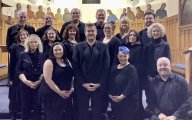Dumpy, located in the deepest network of tunnels beneath the castle, would have housed 300-plus government and military officials as one of the country's twelve designated Regional Seats of Government (RSGs). Its network of seven corridors and 30-plus rooms 150 feet below the surface would have become operational following nuclear attack in the hope of maintaining some semblance of order for those who had survived above.
Once fully equipped and designed to keep those inside 'safe' from nuclear fall-out, the austere rooms and tunnels of Dumpy are now largely devoid of their equipment, furnishings, fixtures and fittings, but still retain a chilling air of the Cold War.
On a series of special 30 minute tours, taking place each day for the duration of the Cuban Missile Crisis - from 17-31 October - castle visitors can for the first time see some of Dumpy's secret nuclear rooms, which were the scene of a hush-hush NATO exercise just days before the Crisis shook the world.
In September 1962, when mounting tension between the USA and Cuba looked likely to trigger nuclear war, the secret NATO exercise - codenamed FALLEX and held over two weekends at six of the RSGs - revealed just how unprepared the country was at dealing with the aftermath of a nuclear strike. One shortcoming discovered during the exercise at Dumpy was the inability for those inside to communicate with the outside world. This resulted in a purpose-built BBC studio subsequently being added to Dumpy's facilities.
A small exhibition accompanying the tours displays a message form from Dumpy during Fallex to civil defence regions in the south east, an organisational chart, grid map for marking nuclear fallout in the RSG 12 region and other cold war artefacts. Visitors can also watch a short video reconstruction of some of the rooms as they looked in the 1960s.
English Heritage Senior Curator, Rowena Willard-Wright said: "We hope that these special events and tours will give our visitors a chance, not only to see spaces within the Castle that have been closed to the public, but also to find out about our recent new research as we uncover the extent of Dover's Castle's secret role in the Cold War, and in particular in this anniversary year, how Dover played its part in the run up to the Cuban Missile Crisis."
Peter Lindley, who at just 18 and a Royal Navy writer, took part in Exercise Fallex at Dover Castle in 1962, recalls: "One morning the Commander came rushing in with a signal hot off the teleprinter which stated 'Nuclear Burst in the Channel.' He thought of alerting all channel shipping but was concerned if he did, it would cause chaos as recipients of his message would not know whether it was for real or otherwise. This underlined how badly prepared we were and a few week's later when the Cuban Missile Crisis came to a head, I remember bumping into one of the chaps I was on exercise with and we both agreed that if the worst came to the worst, RSG Dover was a place to avoid."
The 30 minute public tours cost £5 per person and can accommodate limited numbers. They can be pre-booked by visitors on arrival at Dover Castle on a first come, first served basis.
Longer tours taking in more rooms, including the BBC studios, latrines and tunnel ventilation equipment, have been arranged as part of a series of exclusive English Heritage member events. They are:
- October 1962: Preparing for Armageddon, on Friday 9 November from 10am to 5pm. The day includes an expert-led talk on how the British state reacted during and in the aftermath of the Cuban Missile Crisis, a tour of the RSG and includes lunch and refreshments. Price £80 per adult.
- Secret Tunnels of Dover Castle: A Place in the Bunker, on Wednesday 12 December, Thursday 24 January and Tuesday 12 February (1pm to 4pm). English Heritage curators and Cold War expert Mark Bennett will describe Britain's reaction to the nuclear threat after World War II. Includes a tour of Dumpy and light refreshments. Price £40 per adult.
For details of English Heritage membership - which costs from £35 per person per year and gives free admission to sites, free or reduced entry to events and access to a range of member-only events, visit www.english-heritage.org.uk/membership or call 0870 333 1182.

